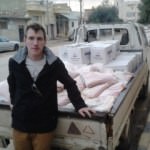Cellmate: Kassig is scared but hopeful
French journalist Henin, who shared a cell with Kassig, says he hasn’t given up hope despite ISIS’s threat to behead him:
If you have no hope whatsoever, you just can’t survive. It was surely very difficult for him to have seen us leaving. But still it means that something is going on and something positive so it helps … but then to see people taken off the cell to be killed must … be extremely hard.
Time interview
 Kassig tells the magazine about forming his NGO, SERA, after he was deployed to Iraq as an Army Ranger in 2007:
Kassig tells the magazine about forming his NGO, SERA, after he was deployed to Iraq as an Army Ranger in 2007:
I divide by time between my personal volunteer efforts, my organizations relief operations, which include the distribution of aid materials such as medical equipment and children’s clothing, as well as food and cooking materials in both Lebanon and Syria.
CNN interview
Kassig is profiled in a CNN interview.
We each get one life and that’s it. We get one shot at this and we don’t get any do-overs, and for me, it was time to put up or shut up. The way I saw it, I didn’t have a choice. This is what I was put here to do. I guess I am just a hopeless romantic, and I am an idealist, and I believe in hopeless causes.
I am not a doctor. I am not a nurse. But I am a guy who can clean up bandages, help clean up patients, swap out bandages, help run IVs, make people’s quality of life a little bit better,” he says. “This is something for me that has meaning, that has purpose.
There is this mentality from where I come from back home that I have a little bit of a problem with. I don’t want to get on a political soap box, but at the same time we have to think about why as a country we choose to help certain people and not others. We have to think about why we just chalk up the Middle East [as] this complex enigma that we will never understand because they are so different from us. But at the end of the day, they are really not. It’s just about whether or not you’re willing to go out on a limb and understand something.
This is real, and it’s scary stuff, and it’s sad what is happening to people here. People back home need to know about it, they need to know. Sometimes you gotta take a stand, you gotta draw a line somewhere.
